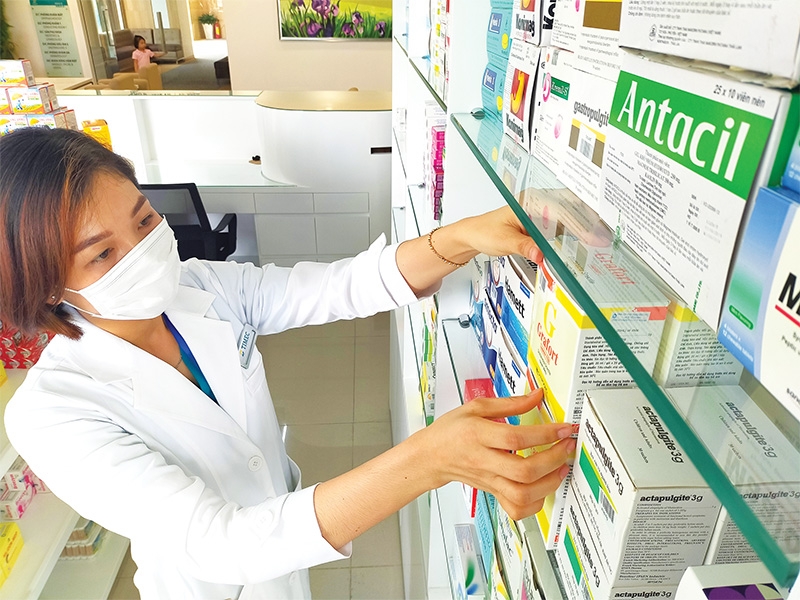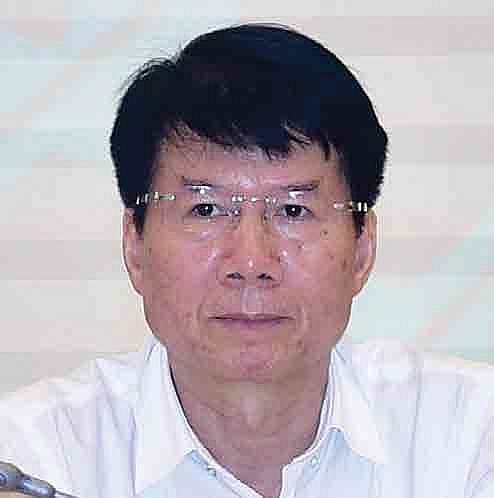Digitalisation prompts evolution of healthcare
 |
| Healthcare digitalisation promises access to high-quality services for patients |
According to a VIR source, multinational corporations (MNCs) are reinforcing their digital transformation with longer-term investments in Vietnam, not only to deal with restrictions during the COVID-19 pandemic but also to catch up with the digital trend in pharmaceuticals, following the Ministry of Health’s (MoH) mid-August announcement of the digital transformation scheme in the pharmaceutical industry.
Nitin Kapoor, chairman cum general director of AstraZeneca Vietnam Co., Ltd. said that the scheme aligns with the company’s own digital transformation strategy that is already being implemented. The company is investing in digital technology and innovation to improve health services for Vietnamese patients and enhance the healthcare ecosystem.
AstraZeneca Vietnam is promoting and actively using webcasts, video-based continuous medical education, and telehealth forums with hospitals and others to help enhance healthcare professionals’ (HCPs) capabilities and improve the quality of disease diagnosis and treatment, particularly in non-communicable diseases like respiratory and gastrointestinal, cardiovascular metabolism, and oncology.
“In less than six months, our digital acceleration initiative has seen us host 52 virtual events with the participation of 20,000+ HCPs. More than 60 per cent of our target HCPs have engaged with us via digital platforms, either one-on-one or in groups,” Kapoor said. “All the information about our latest innovative products and treatments, clinical data, and international guidelines, as well as materials from virtual and offline conferences will be made easily accessible to HCPs via our new HCP portal website that will soon be introduced.”
By the end of this year, the group will complete building 60 Smart Neb rooms for children hospitals in Vietnam, deemed a treatment model for the future and allowing for more accurate analysis of clinical data and generation of real world evidence.
“We are also partnering with medical associations to support the launch of an application to help doctors easily keep track of patients’ GERD (gastroesophageal reflux disease) treatment on smartphones, thereby improving treatment adherence and outcomes for patients,” Kapoor added.
AstraZeneca Vietnam in July signed a pharmaceutical distribution partnership with National Phytopharma JSC, one of the first such agreements between a Vietnamese pharmaceutical distribution company and a MNC. Building on the investment of VND5 trillion ($217.4 million) last year during the Vietnamese prime minister’s visit to its global manufacturing site, this is the next step to expedite its innovative solutions to address local healthcare needs and create value for patients and society.
Similarly, other MNCs including Sanofi, GSK, and Pfizer have been drawing up new plans for Vietnam. Novartis plans to continue reinforcing its digital transformation with longer-term investments by shifting its business model to utilising virtual engagement, providing digital platforms for customer-facing activities, and equipping HCPs with enhanced digital capabilities in the new environment.
“We will apply digital transformation to both internal operations and external customer-facing activities as a way to align with the digital transformation scheme of Vietnam’s MoH,” a representative of Novartis Vietnam told VIR.
“We apply digital solutions in communication and connection activities with HCPs to ensure continued provision of information by organising virtual conferences and video calls, conducting remote detailing, establishing dedicated medical social media platforms for HCPs to update information, and strengthen the virtual capabilities of HCPs through training on attractive virtual engagement and interaction.”
The Novartis representative elaborated that the company applies flexible working space to reduce crowding in the office and provide comfort for associates. At the same time, it is acquiring digital capabilities and infrastructure facilities for its staff to ensure virtual interactions with HCPs are conducted in a face-to-face manner and align with HCP preferences, while also remaining fully compliant with industry standards and regulatory requirements. The sales team is also encouraged to engage virtually and meet at home or any appropriately comfortable place.
Since last year, Novartis has prepared for this transformation journey in Vietnam by adjusting its business and customer-facing model to adapt with new requirements, enhancing capabilities for its staff, and helping customers move forward with new engagement models.
The digitalisation of healthcare is improving disease prevention and treatment, and increasing patient access to high-quality and timely healthcare services despite geographical distance. It is also standardising and streamlining health records, freeing up doctors’ time to better diagnose and treat patients while empowering patients to play a more active role in managing their own health.
With the announcement of the scheme, the MoH has marked a new breakthrough in digital transformation in the pharmaceutical industry, helping to further facilitate business activities, increase people’s satisfaction, and increase transparency in state management.
As part of the strategy, the Drug Administration of Vietnam will continue to increase technology application to connect with plants so as to manage the data of about 700 active elements used in drug production in Vietnam and apply the advanced technologies of Industry 4.0 such as the Internet of Things, big data, analytics, and AI to successfully promote digital transformation in the industry while strengthening international cooperation in the field.
| Truong Quoc Cuong - Deputy Minister of Health
To promote the role of IT and tap into the opportunities of the digital era, the government has been issuing supporting policies to spur development and application of IT, especially in e-government. Digitalisation is the foundation of digital transformation in the pharmaceutical industry, thus contributing to develop Vietnam’s healthcare system into a modern, high-quality, transparent, and efficient one amid the country’s global integration, while increasing access to information about drugs among the locals, businesses, and healthcare workers; and enhancing efficiency in state management, and safe drug usage. This is just the beginning of a new period which requires us to improve capacity of state management, and job handling skills. However, digital transformation also means a change of mindset. Units should use resources and available technical system to digitalise themselves, restructure of work processes, and change organisational structures and relationships from traditional into digital ones. At present, the ministry completes its online connection for all administrative procedures, while some of our units are working on digital transformation plans. Nguyen Thi Tuong VI - Head of Regulatory Affairs, Communication and Government Affairs, GSK Vietnam
It is great to see that the National Digital Transformation Programme is making significant progress and that Vietnam is receiving more and more advantages in the digital era. This transformation is expected to allow better quality, availability, and transparency of information, thus enabling an environment of trust that facilitates business activities as a whole. Since 2015, GSK has been revolutionising the way that we interact with healthcare professionals to better meet their needs on science and clinical practices’ information. Our new approach has utilised many different methods to help them access information at their convenience instead of wasting time and money on travel. For instance, through webinars we can reach more medical staff in different regions across the country. Also, we have adopted multimedia communications to enhance education activities, helping healthcare professionals to share their experiences, ideas, and knowledge with their counterparts in Asia or Europe. Didier Martin - Head of Business Operations & Strategic Projects, Sanofi Indochina
With this transformation, what will be important moving forward is to provide clear guidance for the pharmaceutical industry as transformation is permanently evolving towards new approaches and technologies. At Sanofi, digitalisation accelerates our transformation. We use digital technologies, advanced data analytics, and AI to accelerate the research and appliance cycle, clinical trials, and regulatory reviews, as well as improve productivity and enabling understanding of diseases. Furthermore, our factories are empowered by digital and user-oriented solutions contributing to a sustainable manufacturing system, which drives higher productivity, agility, and flexibility. Lastly, to reinvent the way we work, we are implementing various digital projects in order to enhance empowerment, simplicity, and productivity. The Ministry of Health’s initiative comes at the right moment, and Sanofi is contributing to the Vietnamese digital transformation through its patient-centric approach. |
What the stars mean:
★ Poor ★ ★ Promising ★★★ Good ★★★★ Very good ★★★★★ Exceptional
Themes: Digital Transformation
- PM sets five key tasks to accelerate sci-tech development
- Ho Chi Minh City launches plan for innovation and digital transformation
- Dassault Systèmes and Nvidia to build platform powering virtual twins
- Sci-tech sector sees January revenue growth of 23 per cent
- Advanced semiconductor testing and packaging plant to become operational in 2027
Related Contents
Latest News
More News
- Spring Fair 2026 boosts domestic demand (March 02, 2026 | 16:30)
- Law on Investment takes effect (March 02, 2026 | 16:21)
- Ho Chi Minh City attracts nearly $980 million in FDI in early 2026 (March 02, 2026 | 10:57)
- Businesses bouncing back after turbulent year (February 27, 2026 | 16:42)
- VinaCapital launches Vietnam's first two strategic-beta ETFs (February 26, 2026 | 09:00)
- PM sets five key tasks to accelerate sci-tech development (February 26, 2026 | 08:00)
- PM outlines new tasks for healthcare sector (February 25, 2026 | 16:00)
- Citi report finds global trade transformed by tariffs and AI (February 25, 2026 | 10:49)
- Vietnam sets ambitious dairy growth targets (February 24, 2026 | 18:00)
- Vietnam, New Zealand seek level-up in ties (February 19, 2026 | 18:06)




 Tag:
Tag:




















 Mobile Version
Mobile Version